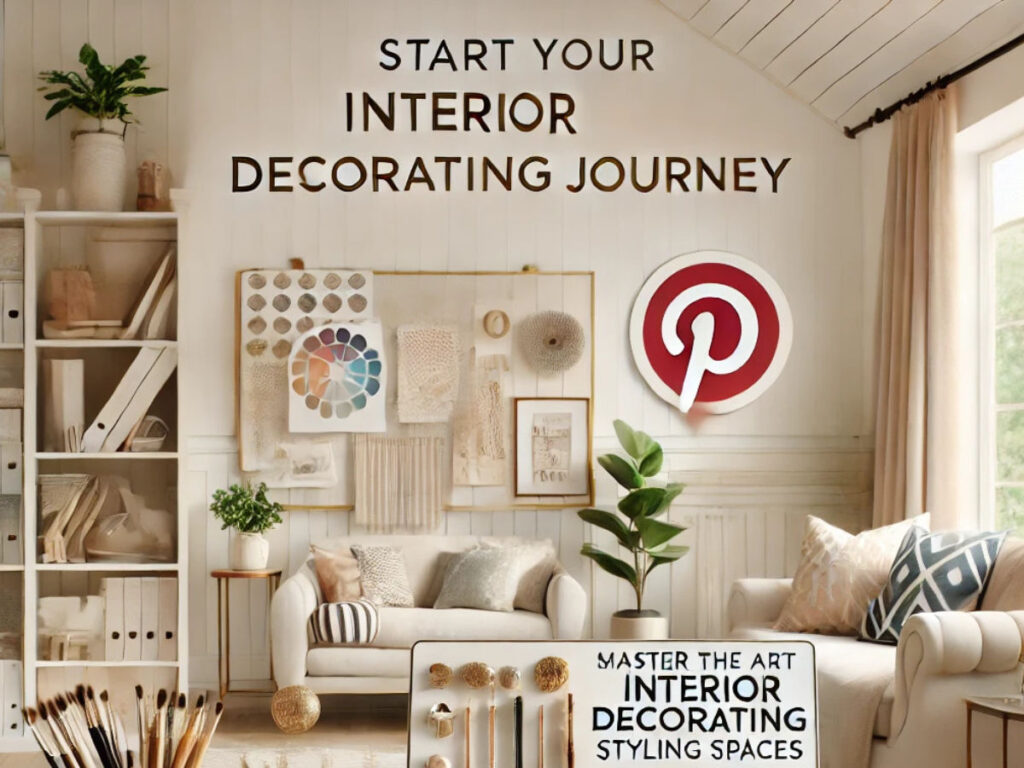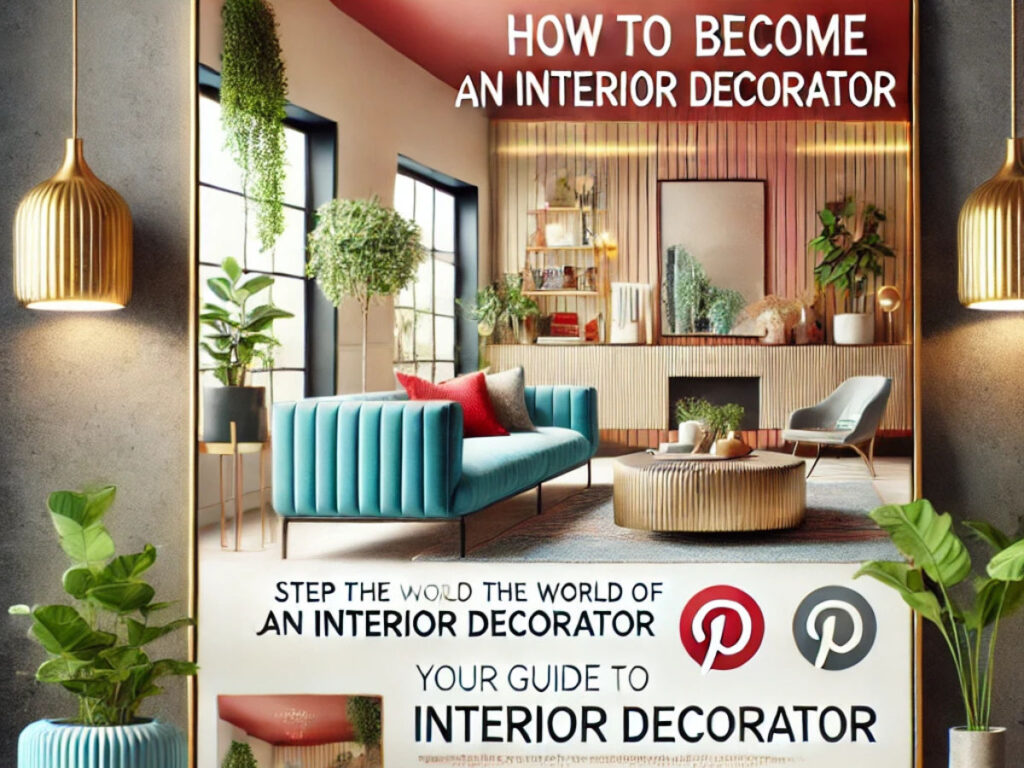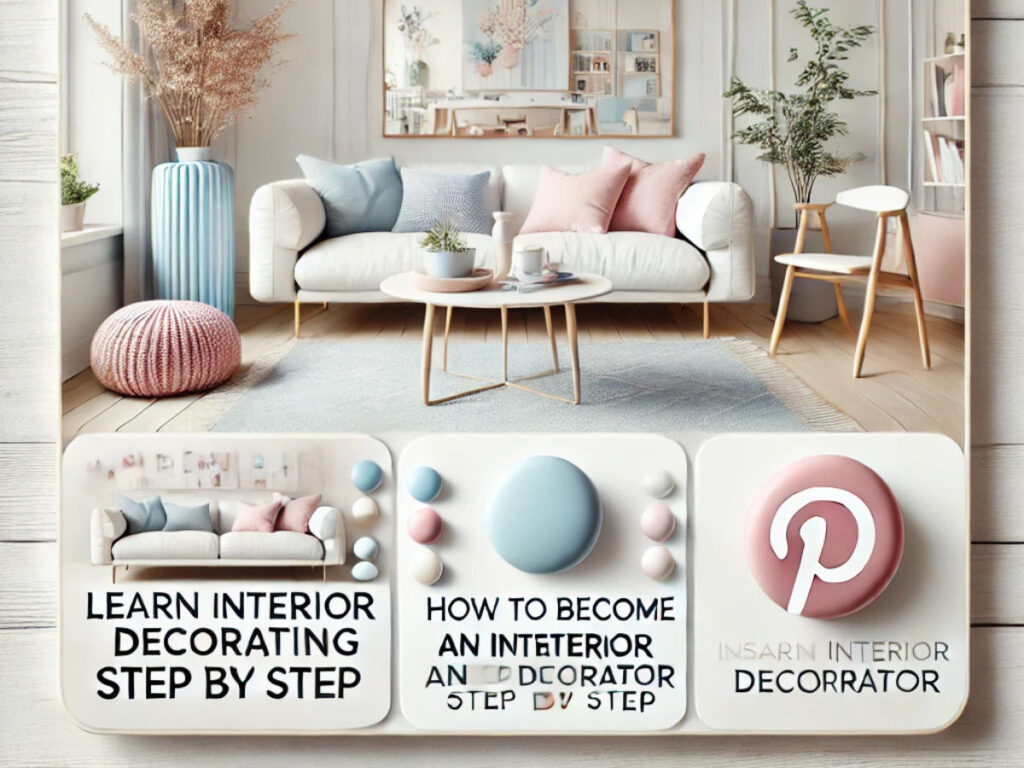Becoming an interior decorator is a dream for many creative individuals who have a passion for transforming spaces. If you’ve ever imagined turning a dull room into a stylish haven or envisioning how colors, furniture, and lighting can change the mood of a space, then a career in interior decorating could be the perfect path for you.
In this article, we’ll break down everything you need to know about how to become an interior decorator, from the skills you need to the steps to get started, and even how to make your mark in this exciting field.
1. Understand the Role of an Interior Decorator
Before diving into the practical steps, it’s important to know exactly what an interior decorator does. Unlike an interior designer, who works on structural changes (like walls and flooring), an interior decorator focuses on the aesthetics of a space. This involves choosing furniture, color schemes, and accessories, and ensuring that everything in a room works harmoniously.
Think of an interior decorator as the artist and the space as their canvas. They consider how the placement of furniture and decor can influence a room’s function, feel, and look.
Example:
Imagine walking into a cozy café. The soft lighting, comfortable chairs, and calming colors on the walls all contribute to creating a welcoming atmosphere. An interior decorator would be responsible for selecting these elements, ensuring they complement each other and create the right vibe.
2. Develop the Necessary Skills

To be an interior decorator, you do not need formal education, but you should develop some skills and qualities to do well. These skills will help you understand what clients want, choose the right materials, and make beautiful spaces.
Creative Vision
As an interior decorator, your main tool is creativity. You must imagine how different furniture, lights, and decorations can come together to look good. Spend time looking at different styles and notice how they affect your feelings, whether they are modern, minimalist, bohemian, or traditional.
Attention to Detail
The little things matter. Whether it’s ensuring the throw pillows match the curtains or the lighting is just right for the mood of the room, your attention to detail will make all the difference.
Communication Skills
Interior decorators work closely with clients, suppliers, and contractors. Being able to communicate your ideas is essential to getting your vision across. Whether through sketches, mood boards, or verbal discussions, you need to be able to explain how your design ideas will work in a space.
Problem-Solving
Designing a space isn’t always straightforward. There will be challenges, like working with limited space or a specific budget. You’ll need to find creative solutions to make the most of the resources available.
3. Gain Experience
Like any other profession, becoming an expert takes time and hands-on experience. The good news is, there are many ways to gain this experience. Few ways to get started:
Start Small
You don’t have to begin with big projects right away. Start by redecorating your home or helping friends and family with their places. This lets you try new things, learn, and create your portfolio.
Internships and Volunteering
You may also get familiarized with the job by interning with an experienced decorator or assisting in small projects. It becomes a means of learning about the work and making contact in that field.
Take on Projects
Once you feel confident, start taking on paid projects. These can be as simple as helping someone rearrange their furniture or working on a specific room in their home. As you build your reputation, you can take on bigger and more complex projects.
4. Formal Education and Certification
Although not required, formal education can make you more visible in the competitive field of interior decorating. Many schools offer classes in interior decoration or design, which teach the basics of design principles, color theory, furniture choice, and much more.
Online Courses
If traditional schooling isn’t for you, online courses can be a great alternative. Platforms like Udemy or Skillshare offer a wide variety of courses that cater to different skill levels. You can learn at your own pace and cover topics like interior design basics, space planning, or lighting techniques.
Certification
While interior decorators don’t always need to be certified, obtaining certification from a professional organization, such as the British Institute of Interior Design (BIID), can increase your credibility and help you stand out to potential clients. Certification demonstrates that you have the knowledge and skills to work in the industry.
5. Build Your Portfolio

Your portfolio is a great tool to attract clients and present your work. Start by writing down every project you do, no matter how small. Add before-and-after photos, client reviews, and any design ideas you made. As you gain more experience, you can expand your portfolio with larger projects.
Create a Website
A professional website is important in today’s digital world. Use it to showcase your portfolio, share your design philosophy, and provide a way for potential clients to contact you. Including SEO keywords like “interior decorator” and “affordable decorating services” will also help you get discovered online.
Leverage Social Media
Platforms like Instagram and Pinterest are perfect for interior decorators. Share photos of your work, design tips, and inspiration. Use hashtags like #interiordecorator and #interiorstyling to attract a broader audience. These platforms can also help you network with other professionals and clients.
6. Network and Market Your Services
Networking is crucial to growing your business as an interior decorator. Attend industry events, join design associations, and connect with other professionals, such as architects, contractors, and furniture suppliers. Word-of-mouth referrals are often one of the best ways to gain new clients.
Marketing Your Services
Plan to promote your services. This can be through social media ads, collaboration with local businesses, free design consultations, and asking happy clients to leave reviews.
7. Stay Updated on Trends
Interior decoration is constantly changing. New styles, colors, materials, and technologies emerge daily. Keep updated by reading design blogs, subscribing to interior design magazines, and attending trade shows. The more you learn, the better ideas you can provide for your clients.
Example:
Consider the rise of sustainable design. As people become more eco-conscious, they seek out interior decorators who can incorporate sustainable materials and practices into their designs. Keeping up with trends like this can give you a competitive edge.
Conclusion
Becoming an interior decorator is a rewarding career for those with a passion for design, creativity, and problem-solving. With the right skills, experience, and a little determination, you can turn your love for decorating into a fulfilling profession. Whether you’re starting small with personal projects or jumping into professional design, remember that every step you take gets you closer to making a lasting impact on the spaces you work in.
Start by learning the basics, building your portfolio, and networking with others in the industry. The world of interior decoration is full of opportunities for those who are ready to put their creativity to work.
FAQ: How to Become an Interior Decorator
1. What qualifications do I need to become an interior decorator?
Formal education is not strictly necessary but most interior decorators do have at least a degree or certification in interior design or a related field of interest. You can also receive courses and workshops online to learn what you need to know to succeed.
2. Do I need to have a background in design to become an interior decorator?
No, a design background isn’t required, but it helps. Many successful interior decorators have built their careers through self-learning, hands-on experience, and a natural sense of style. You can start by redecorating your own home or helping others with small projects.
3. How much money can I make as an interior decorator?
The pay is usually determined by experience, location, and size of the projects. An interior decorator may earn anything from £25,000 to £50,000 per year. However, with a huge client base and big-profile projects, successful decorators can earn much more.
4. How long does it take to become a successful interior decorator?
It’s not the same for everyone, but it usually takes a few years to build a reputation, gain experience, and create a portfolio. Regular networking, ongoing education, and practical experience will help you to succeed more quickly.
5. Is interior decorating a good career choice?
Yes! Interior decorating is a highly rewarding career for those with a passion for design and creativity. As long as you’re committed, constantly learning, and building your network, it can be a lucrative and fulfilling profession.


